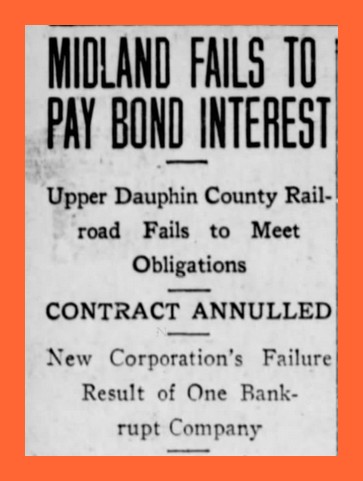 An article in the Harrisburg Telegraph, 12 July1912, told of the bankruptcy of the Lykens Valley Construction Company and the failure of the Midland Pennsylvania Railroad to meet its bond interest obligation:
An article in the Harrisburg Telegraph, 12 July1912, told of the bankruptcy of the Lykens Valley Construction Company and the failure of the Midland Pennsylvania Railroad to meet its bond interest obligation:
MIDLAND FAILS TO PAY BOND INTEREST
Upper Dauphin County Railroad Fails to Meet Obligations
CONTRACT ANNULLED
New Corporation’s Failure Result of One Bankrupt Company
Special to the Telegraph
Philadelphia, Pennsylvania, 12 July [1912] — The Midland Pennsylvania Railroad Company has defaulted in payment of interest on its five per cent bonds, due July 1. This failure to pay interests follows the failure of the Lykens Valley Construction Company, which guarantee the railroad bonds.
It is known on good authority that $242,000 of the bonds of the railroad company have been sold, and it is said in financial circles that a total of $800,000 worth of the securities have been disposed of to date.
An officer of the company and various men closely concerned in it said yesterday that steps were already taken for securing the interest due July 1, and added that despite the defaulting of payment, the company is now in a more flourishing condition than it has ever been before.
“This company is on the square and is going to build its road right through,” said Assistant Secretary J. B. Lear yesterday, when seen in his office, 1033 Real Estate Trust Building. “We have no longer any connection with the Construction Company and are not connected in its downfall.”
The Midland Company and the bankrupt construction company were linked up by a working agreement, by which the construction company carried on the actual operation for the railroad company and paid interest on the bonds from the money received to carry on the work.
Extent of the Operations
The Midland Pennsylvania Railroad Company is one of a group of corporations operating in the Lykens Valley, which are controlled by a group of prominent Philadelphia capitalists, who are interested in the development of the section.
The railroad company was organized with an authorized stock issue of two million dollars par value fifty dollars. A bond issue of two million dollars was then authorized to care of half the cost of constructing the railroad.
The operation was to be from Millersburg to Ashland, in the Lykens Valley, a distance of forty-four miles. Work was begun in September 1910 and up to date about fifteen miles are graded from Millersburg to Gratz. No rails or ties have been laid. The road has been planned to connect with the Northern Central Railroad at Millersburg and with the Reading Railroad at Ashland. The estimated cost is four million dollars, and this sum is, of course, provided for by the stock and bond issues. The cost of the work on the road until March 1 of last year was $484,000. The stock and bonds were issued as the work progressed, so that at that date the stock issue was $242,000 and the bond issue the same.
Contract Annulled
The Lykens Valley Construction Company secured the contract for building the railroad in September 1910, and held it until June 26 when the railroad company officials annulled the contract with a resulting large forfeit of securities by the construction company. A few days after the suit of the Franklin Trust Company was heard in Court, for the recovery of interest on $60,000 worth of notes of the Schuylkill and Dauphin Traction Company, payment on which had been guaranteed by the construction company.
The construction company acknowledged itself bankrupt and is now awaiting the judgment of the court.
The construction company also was the guarantor of the railroad bonds and was responsible in the same way, but the latter corporation evaded the issue by abrogating its contract with the construction company in tome absolving it of responsibility for paying the bond interest on July 1.
The bonds are secured by fifty-one percent, of the railroad company’s stock, which is in the vaults of the Commonwealth Trust Company of which Dimner Beeber, a director of the railroad corporation is president. Mr. Beeber is at present on his way to Europe.
Call It a Family Affair
Officers of the railroad company say that the issue of the bonds is confined to a few “gentlemen of prominence and distinction,” and that the stockholders and bondholders were “just like a big family,”
“The matter is within the family,” said Assistant Secretary Lear, “and we don’t feel that it is of any interest to the public. I can say, however, that negotiations are now being completed for securing interest from the bonds already out, while preparations have been completed for the sale of another million dollars’ worth of bonds through a bond issue. With this money we will complete the railroad and make it an earning operation.”
It is a fact, however, that the bonds were publicly advertised for sale, and that reports were made in financial circles that the bonds were widely distributed.
Company Without a President
Walter E. Harrington, who is the general manager of the insolvent Schuylkill and Dauphin Traction Company, was formerly president of the railroad company, but he resigned last November. The office has been vacant since then, but it is said that the stockholders are looking around for a suitable head at the present time and may elect a president very shortly.
Other officers of the corporation are Finley Acker, vice-president; Samuel F. Houston, treasurer; John H. Williams, of Pottsville, secretary and John B. Lear, assistant secretary. The directors, besides the officers are Dimner Beeber, George B. Wells and Joseph F. Romberger, of Berrysburg.
_____________________________
Corrections and additional information should be added as comments to this post.